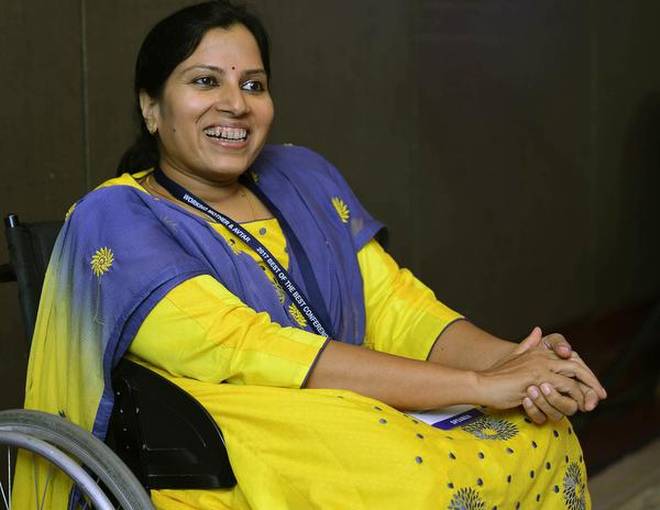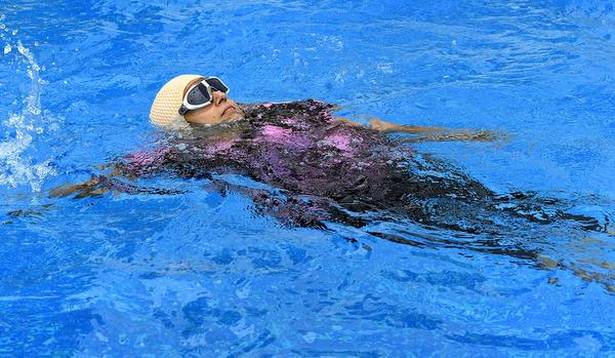
Undeterred by disabilities, Madhavi Latha knows how to fight back. A champion swimmer, she now heads the Wheelchair Basketball Federation of India
Polio at the age of seven months paralysed Madhavi Latha from the waist down. It left her with minimal movement in her hands and robbed her of her voice even. But with time and perseverance she managed to regain some control over her hands and her voice. The daughter of a school teacher father and a homemaker mother, Latha, was the youngest of four siblings in a remote village in Andhra Pradesh (now Telangana). The polio attack and her limited motor skills didn’t deter her from completing school and pursuing a college degree privately. After she completed her MSc in Math, she eventually got a job with a bank in Hyderabad, before moving on to Standard Chartered in Chennai.
And life seemed set for her, until 10 years ago when her limited movements led to a compression of her spinal cord and in turn compression of her lungs, leading doctors to give her not more than a year to live. Determined to fight back, as she always has since she was a baby, Latha turned to hydrotherapy to strengthen her muscles and ease the pressure on her spine. And that’s when she discovered her new love — swimming. Through sheer grit and determination, she began to swim competitively and went on to become the National Paralympic swimming champion when she won three gold medals in her category in 2011. No mean feat for someone with a disability as severe as hers and at the age of 40.
Her win, silenced all the nay-sayers. “The first time I wanted to swim competitively at the corporate Olympiad, the organisers were not convinced. So, I had four people swimming around me for my security. In fact, when I first tried my hand at swimming, I didn’t have a coach. I self-learnt freestyle, which then convinced the coach to teach me the remaining styles. I wanted to set an example for other people with disabilities and so pushed myself further,” she says. Her tryst with swimming was a turning point in her life. “Moreover, being in water made my body light and the buoyancy helped me do all the things that I couldn’t outside of it,” she adds.
Swimming, was only the beginning for this determined woman. She is now heading the Wheelchair Basketball Federation of India that she set up in conjunction with others in 2014. “This came about when a UK-based NGO introduced me to the sport and encouraged me to promote it. It intrigued me as it is rather energetic and inculcates a great sense of team spirit in those involved in the sport. In the last three years we’ve managed to enrol 600 players from 14 states in the country — from Jammu and Kashmir to Kanyakumari,” she says, adding that this venture is not without its fair share of challenges either. “One of the biggest challenges is convincing people to encourage this sport; often it is concerns over players’ safety that comes to fore, since people aren’t convinced about just how much people with disabilities are capable of. Also, sports wheelchairs are not manufactured in India and are often imported, thereby raising costs. We’re also working towards making sports arenas more accessible for those with disabilities. When tournaments take place there are concerns about accessibility in terms of transport and accommodation. And since we know that a lot of these aren’t inclusive in nature yet, we go prepared, so there are no rude shocks upon our arrival.”
For the Asian Para Games
While the WBFI has received an invitation from the International Wheelchair Basketball Federation — Asia Oceania Zone, Madhavi Latha and the teams are working towards raising support to help them participate in the qualifiers in Thailand.
To arrange a training camp in Chennai for the national team (for men and women) to prepare for the qualifiers and to select 12 players in each team.
A coach from abroad to run this camp.
To send both the men’s and women’s teams to Thailand and pay their registration fees which amounts to ₹ 3.7 lakhs.
Madhavi Latha can be contacted on 9841609601
_____________________________________________
But this struggle is not new to Latha. “My parents always wanted me to be financially independent. So after completing my MSc in Mathematics, I even trained as a typist so I could get a typing job. That is when a cousin told me about jobs in banks that I could apply for. In 1991 I managed to land my first job with State Bank in Hyderabad; expectedly there was a lot of convincing to do. Having had to move to Hyderabad from my small town, I even learnt how to ride a scooter so I could commute and gradually moved on to driving a car. I eventually got an opportunity to join Standard Chartered and moved to Chennai for the new role in 2006,” she says.
In the meantime, the lack of physical activity began taking a toll on her. “The exercises I’d been asked to do were rather painful and involved callipers being put from shoulder down. It felt like being in a cage and I neglected to follow up on them, not realising the seriousness of the consequences.”
Even while she was pursuing her college degree privately, Latha began giving tuitions at home to students a couple of years younger than her. “I wanted to surround myself with people closer to my age so I didn’t miss college life as much,” she smiles.
Today, she leads a busy life with her hands full with professional responsibilities at Standard Chartered and her role at the WBFI. “I want people to realise that people with disabilities can do a range of things as well. It’s important to sensitise people around them to lend adequate support. Currently our basketball team is gearing up for the qualifiers of the Asian Para Games that will be held in March 2018 in Bangkok. While our players have great potential, there’s a lot more we need in terms of support. And we are working towards ensuring that our teams qualify,” she says.
source: http://www.thehindu.com / The Hindu / Home> Society / by Ranjani Rajendra / November 27th, 2017
